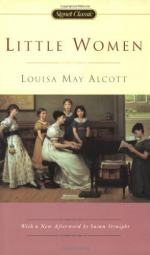“I never ought to, while I have you to cheer me up, Marmee, and Laurie to take more than half of every burden,” replied Amy warmly. “He never lets me see his anxiety, but is so sweet and patient with me, so devoted to Beth, and such a stay and comfort to me always that I can’t love him enough. So, in spite of my one cross, I can say with Meg, ‘Thank God, I’m a happy woman.’”
“There’s no need for me to say it, for everyone can see that I’m far happier than I deserve,” added Jo, glancing from her good husband to her chubby children, tumbling on the grass beside her. “Fritz is getting gray and stout. I’m growing as thin as a shadow, and am thirty. We never shall be rich, and Plumfield may burn up any night, for that incorrigible Tommy Bangs will smoke sweet-fern cigars under the bed-clothes, though he’s set himself afire three times already. But in spite of these unromantic facts, I have nothing to complain of, and never was so jolly in my life. Excuse the remark, but living among boys, I can’t help using their expressions now and then.”
“Yes, Jo, I think your harvest will be a good one,” began Mrs. March, frightening away a big black cricket that was staring Teddy out of countenance.
“Not half so good as yours, Mother. Here it is, and we never can thank you enough for the patient sowing and reaping you have done,” cried Jo, with the loving impetuosity which she never would outgrow.
“I hope there will be more wheat and fewer tares every year,” said Amy softly.
“A large sheaf, but I know there’s room in your heart for it, Marmee dear,” added Meg’s tender voice.
Touched to the heart, Mrs. March could only stretch out her arms, as if to gather children and grandchildren to herself, and say, with face and voice full of motherly love, gratitude, and humility . . .
“Oh, my girls, however long you may live, I never can wish you a greater happiness than this!”



